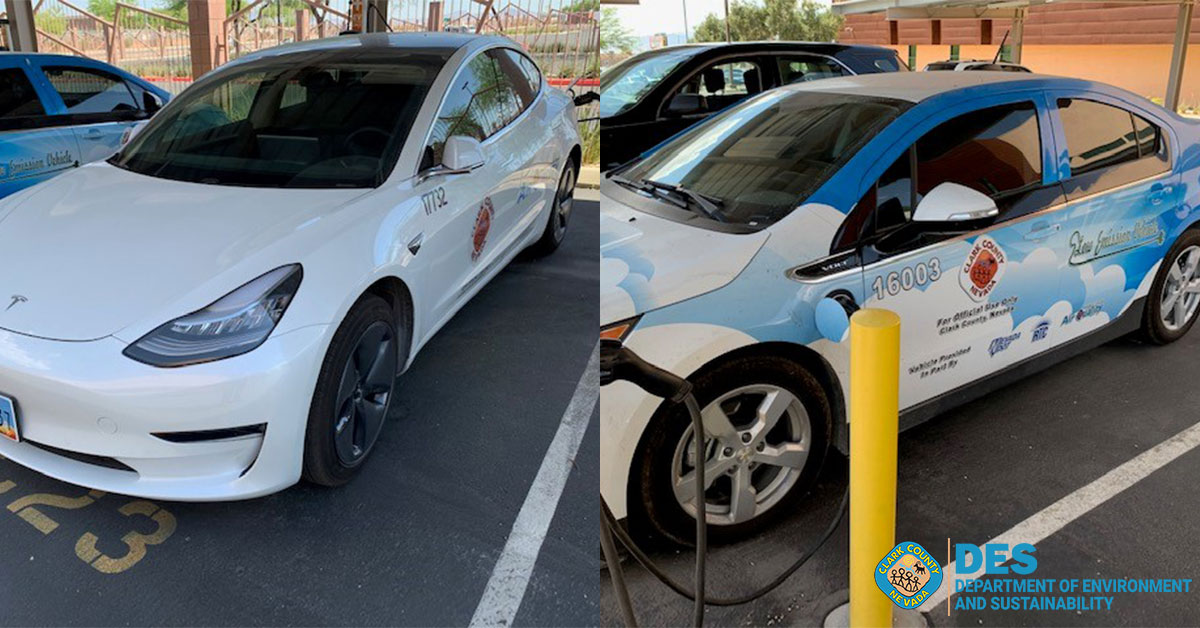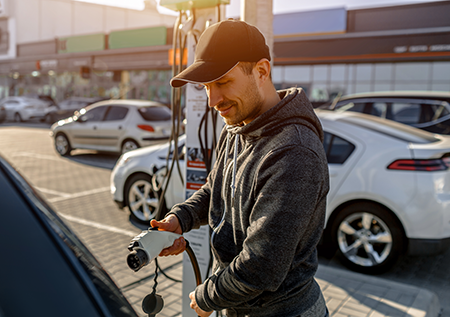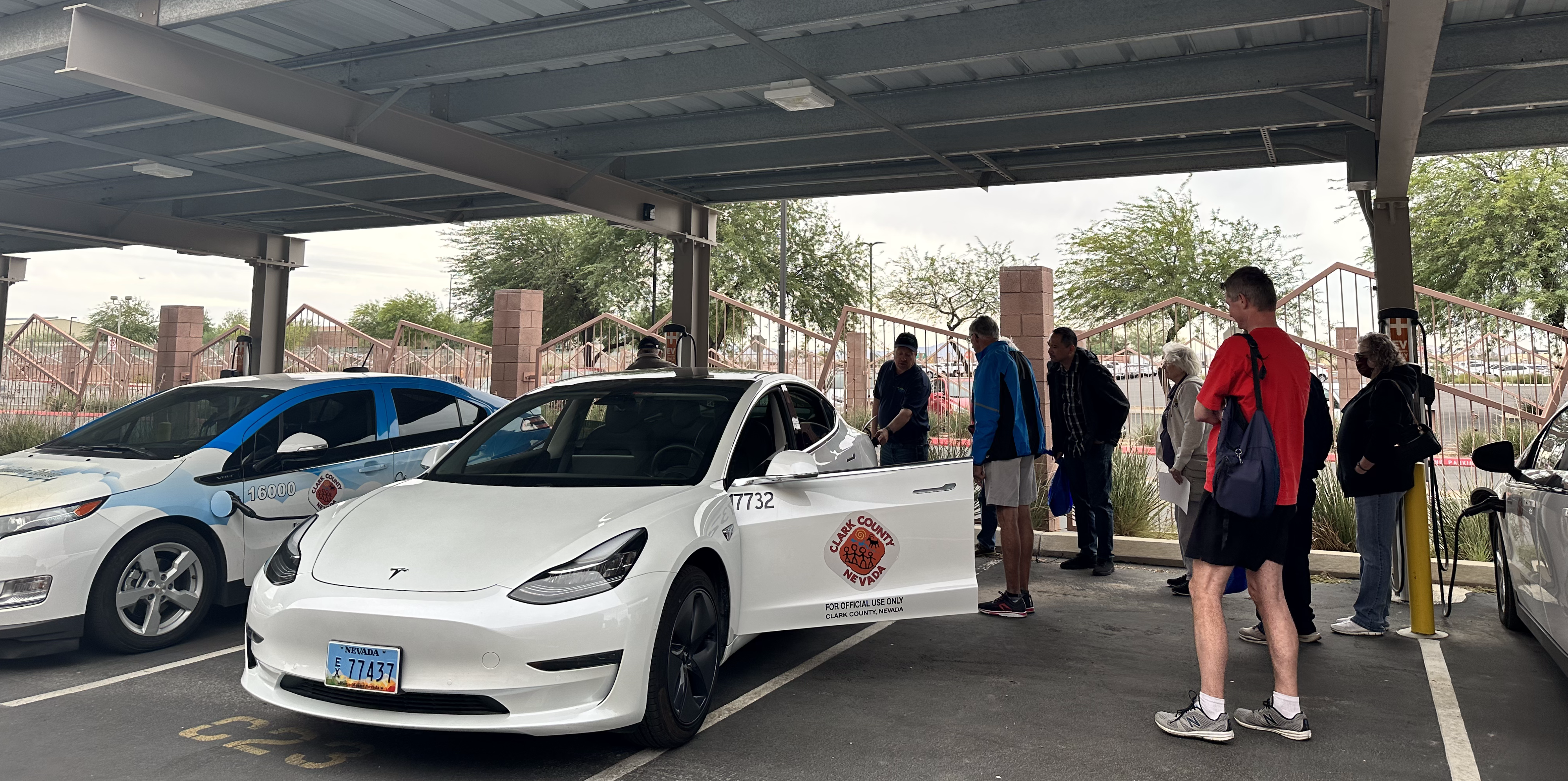Clark County and government partners across Southern Nevada have adopted goals related to improving air quality, reducing greenhouse gas (GHG) pollution, and protecting public health. The transportation sector is responsible for harmful pollutants such as particulate matter 2.5 (PM 2.5), and nitrous oxides (NOx) and volatile organic compounds (VOC) that are precursors to the formation of ozone and contributors to various respiratory and other health related illnesses. Specifically in Clark County, transportation accounts for 7% of PM 2.5 generated and vehicle emissions are the dominant source of NOx at 39% and VOC at 21%. Additionally, at 36%, transportation is the second largest source of GHG emissions in Clark County.
To address these ongoing emissions, improve air quality and public health, and meet climate goals, regional and municipal plans such as
Southern Nevada Strong and the
On Board Mobility Plan
include reducing car dependency and increasing mobility options for residents. However, as Clark County’s population continues to grow, so will the number
of vehicles on the road. Therefore, it is imperative that we also electrify our region’s transportation system and ensure we are continuously increasing the percentage of renewable energy on the grid.
The urgency to address climate change and air pollution is an important factor, but the reality is that electric vehicles (EVs) are here, and they are poised to be the future.
It is in the County’s best interest to prepare now to meet the infrastructure needs of a growing EV market.
Every major vehicle manufacturer in the world is shifting its production to EVs. EVs are increasing in market share and 20% of all new cars are expected to be electric by 2025, 50% by
2030 and 100% by 20401. In addition, national and state policies such as
President Biden’s Build Back Better Agenda
and
Clean Cars Nevada are driving market transformation to EVs. As the number of EVs increase, Clark County
must be prepared to strategically supply the infrastructure necessary to meet this demand. The time to plan for this new infrastructure is now. Most EV infrastructure will be tied to
development. Local buildings constructed today will be in service for at least the next 50 years. Local units of government can help avoid
costly building retrofits such as electrical system upgrades, demolitions and rebuilds, and soft costs such as permits, inspections and approvals by planning for EV infrastructure now.
There are some communities that have been reactive to the transition to EVs, and it has resulted in charging infrastructure in places that does not suit users or is not ideal for the local government. In a poll conducted by Green Car Report in 2019, 74% of respondents agreed that electric cars are the future and 61% cited lack of charging infrastructure as the biggest factor holding back their purchase. If local governments are proactive, they can play a key role in reducing barriers to EV ownership and operation while also guiding infrastructure to where it is most appropriate. Clark County has already been leading in this regard with the largest alternatively fueled vehicle fleet in the state. There is much that can be gleaned from that success for a broader community-wide effort.
In April 2021, as part of its
All-In Clark County Sustainability and Climate Action Initiative, the Clark County Board of County Commissioners provided direction to staff of the Department of Environment and Sustainability (DES) to seek input from stakeholders and interested parties on a potential EV infrastructure ordinance. Staff held a workshop in June 2021 to learn about the issues, barriers and opportunities to adopting an EV infrastructure ordinance. Staff learned the following:
-
There is no lead authority for transportation electrification in Southern Nevada;
-
Energy load and delivery planning for transportation electrification in Clark County is in its infancy and is hampered by complex assumptions based on past practices that do not account for future conditions;
-
Costs at the parcel level can be easily calculated, but total energy infrastructure costs upstream are not well understood or easily calculated; and
-
There is a desire for consistency by developers and the utility regarding EV infrastructure requirements that may be adopted by local governments.
The purpose of the All-In Clark County Transportation Electrification Working Group (TEWG) is to develop, coordinate and implement local programs and strategies to support transportation electrification in Southern Nevada in an equitable manner.
TEWG’s initial focus will be transforming the passenger/light duty transportation sector to EVs, leveraging the experience of Clark County and other advanced public and private fleets. Future phases may tackle the following transportation sectors: other public agency fleets, medium and heavy-duty vehicles and transportation network companies.
TEWG will also serve as a forum to increase the community’s literacy and competency regarding EVs, EV charging infrastructure, utility regulations affecting EV infrastructure, and the costs of EV infrastructure.
Finally, TEWG will serve as a coordinating body that can position the region to take full advantage of utility, state and federal funding opportunities related to infrastructure, clean energy, transportation electrification and EVs.
DES invited core government collaborators to serve as founding members of the TEWG. These agencies have interest, responsibility and specialized expertise in transportation,
energy, development and public fleet management. DES intends to use this core group of government collaborators as a proof of concept for a potential future climate collaborative in Southern Nevada.
DES also invited the non-profits, industries and utilities listed below for their unique interests and specialized expertise related to transportation, development, clean energy
and electric vehicles. These participants may be adjusted in future phases of the TEWG.
| Organization |
Organization Type |
Category |
TEWG, with the assistance of S Curve Strategies, will be asked to gather information and, through a written report, accomplish the following:
-
Provide recommendations on regional transportation electrification goals that:
Meet local, regional and state GHG reduction, climate action and planning goals
Meet local, regional and state GHG reduction, climate action and planning goals
-
Present information about the current and future projected EV population for the region and itemize these data per municipality and unincorporated county.
-
Present information about projected charging demand across the region and per municipality and unincorporated county for the following: public charging, multi-family, single family, workplace, and historically underserved communities.
-
Present information on existing EV infrastructure in the region, itemized per municipality and unincorporated county, and provide recommendations on regional EV infrastructure development needs.
-
Provide recommendations on regional EV charging infrastructure installation planning – focused on transforming light duty vehicles first.
-
Provide recommendations on a model EV infrastructure ordinance that can serve as a consistent and coordinated example of what local governments in Clark County should adopt to fill infrastructure gaps and meet GHG reduction and EV goals.
-
Present information regarding the costs of the model ordinance and how those costs are distributed.
-
Provide recommendations on input to the Nevada Public Utilities Commission that will facilitate the growth of the EV market and charging infrastructure and will fairly distribute costs among utilities, EV owners, developers and property owners in a manner that balances economic development and the benefits of electrifying transportation to the region and State of Nevada.
-
Provide recommendations on strategies for funding the implementation of EV planning and the installation of charging infrastructure and present information regarding all of the tools available to help electrify transportation in Southern Nevada.
-
Present information on economic and workforce development opportunities from electrifying transportation and make recommendations to grow and support the electric vehicle industry in Clark County.
-
Provide recommendations on public information and education strategies that will engage local dealerships and prepare them to roll out the requirements of Clean Cars Nevada and encourage the purchase and successful operation of EVs by Clark County residents.
-
Address structural questions regarding where EV goals will be housed by core government collaborators and transformed into actionable policies and programs
Working Group Operations
-
The working group is advisory to DES staff.
-
The working group may be asked to break into subgroups to tackle particular tasks and subgroups will be asked to present information and recommendations to the working group.
-
Working group meetings will be open to the public. The public will be invited to make comment at the start and end of meetings.
-
Meetings will be convened monthly by DES and facilitated by a DES consultant.
-
It is anticipated that there will be a minimum of six (6) and up to nine (9) meetings.
-
Meetings are expected to be two (2) to three (3) hours but will not exceed three (3) hours.
-
Meeting notes will summarize meeting outcomes and all meeting materials will be provided to the members and made available to the public on DES’s website.
-
Working group members will agree to the information and recommendations presented in its report by consensus whenever possible. The level of consensus achieved will be represented in the report by indicating the members in agreement by name. Members that cannot live with the consensus of the working group will be noted in the report and invited to provide written comments that will be included verbatim in the final working group report.
Uses of the Working Group Report
DES staff will use the working group report to inform the preparation of a 2022 Clark County Transportation Electrification Plan. The Plan will serve as a regional blueprint that core government collaborators responsible for electric vehicle policies and programs can adopt and use to guide the transformation of transportation in Southern Nevada. If successful, DES intends to update the Clark County Transportation Electrification Plan on an annual basis to address future phases and provide support for implementation.
This document will also be used by core government collaborators to position the region to take full advantage of utility, state and federal funding opportunities.
* In-person meetings will be held at the Clark County Building Department, 4701 W. Russel Rd., Las Vegas, Nevada, 89118; and will not be recorded
| Registration |
Date |
Time |
Video |
Presentation |
Meeting Notes




